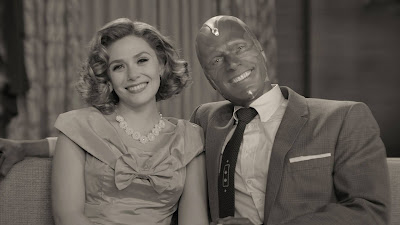A Wandaful Vision of Life
Superheroes. Special Effects. The angst of self-discovery. Corrupt government agents. Supervillains. Romance. Mind-boggling plot twists and turns. Humour. The Wandavision series is shaping up to be another Marvel classic. It certainly makes for great Friday evening TV viewing.
Reimagining History
The feel-good factor of the early episodes has gradually given way to a more dystopian tone with the last two episodes taking a much darker turn. We have just learned that Agatha Harkness is not a background character with larger-than-life levels of kindness. She is actually a witch who has been manipulating and deceiving Wanda in order to learn the secrets of her super-natural powers. Episode 8 begins with a flashback to Salem, 1693, where Agatha is being singled out for discipline by the members of her own witches’ coven.
The historical background to this scene is the famous ‘Salem Witch Trials’ which occurred in Massachusetts in 1692 and 1693. Over 200 hundred people were prosecuted as occultists, with 30 found guilty and a number executed. Whilst making an implicit reference to these true events, the Wandavision scene does not imagine the happenings so much as it re-imagines them. The implicit religious context of colonial Massachusetts is glossed over. Agatha the witch is not being tried by Christian magistrates; she is being tried by other witches.
Social Imaginaries
The way people imagine the world to be is of tremendous social importance. I do not mean here imagination as in our deliberate flights of fictional fantasy when we read a novel or watch a movie. I am referring to the big picture perceptions which shape the way we live by forming the foundation of our conscious values, beliefs, and understanding of what ‘the good life’ is. These are often unconscious and taken for granted. We imagine the world to exist in a particular way and these imaginations are shared by many of the people around us and so rarely challenged. When we encounter people who perceive reality differently it seems so strange that we usually find it easier to dismiss them as ignorant than to allow the truth of our own assumptions to be brought into question.
The Canadian philosopher Charles Taylor has coined the phrase ‘social imaginaries’ to describe this. ‘Imaginaries’ to indicate these taken-for-granted perceptions of the world. ‘Social’ because the individuals making up any given society will draw from a collection of common, shared imaginations, which are mutually reinforced by social interactions and media presentation, as well as through technological developments.
For example, in Massachusetts 1693 pretty much everybody imagined that the world in which they lived was created and sustained by a God who laid claim to humanity’s moral and spiritual allegiance. Atheism as we know it today didn’t really exist yet and even those who rejected the specific claims of Christian religion would still have lived their days out in a broadly theistic social context. To worship and invoke the enemies of this God was not just an individual sin, it threatened to bring divine judgment on the whole society. Whether public trials and executions were justifiable as the best way forward is still an open debate over 300 years later. But for such a society, imagining the world in such a way, doing nothing about witchcraft was not an option.
Fast forward to Massachusetts 2021 and a very different ‘social imaginary’ holds sway. Modern medicine has distanced us from the experience of death. Modern technology has enabled us to master our environment such that we are far less at the mercy of the elements than our ancestors. On a popular level, Darwin’s theory of evolution has made it plausible to imagine the origins of life without any reference to God - a view held by millions of people who have not personally looked at or assessed the supporting evidence. Post-enlightenment philosophical developments and 100 years of mechanised war and totalitarian politics has evoked a strong anti-authoritarian spirit in western society. This list could be extended. The point is that the average Westerner finds it much easier to imagine a world without God now than she would if she was living in 1693. She may be quite unconscious of how big a shift in thinking this is. She is almost certainly unaware of how difficult it was to construct the modern atheism which now seems so easy and intuitive. The society-wide, taken-for-granted way of perceiving the world - the social imaginary - has changed.
What kind of ‘social imaginary’ does Marvel’s radical re-imagining of a Salem witch trial communicate? Two observations.
Firstly, it imagines a world in which magic is neutral. Where in Salem’s history ‘good’ was defined by Christian standards and magic was an evil departure from those standards, in Marvel’s portrayal magic is not inherently good or bad. It is like nuclear technology; a morally neutral phenomenon which could be used for good or bad purposes. Agatha is not condemned by magistrates because being a witch is wrong; she is condemned by other witches for using her power the wrong way - for practicing “the darkest of magic”. Standards of right and wrong are not in any way absolute, they are constructed by communities - in this case a community of witches. If things are wrong, human beings will have to find a way of setting them right because in this world there is no good God who will intervene to oppose and prevent evil.
God is not a character in the script of this social imaginary. In fact, in 1693 Agatha the bad witch triumphs over the good witches who try to restrict her thirst for power. We have to wait until next episode to see whether Wanda the good witch will triumph over Agatha the bad. This is a rather bleak outlook which the Marvel universe shares with what would traditionally be called pantheistic world views. In a world of moral relativity, where there is no dividing line between good and evil, the two must always exist together. Good can only ever triumph until evil takes the ascendancy again; and evil only triumphs until good comes back to the fore. There can never be a final victory of good over evil.
Secondly, it imagines a world in which magic is natural. Agatha is accused of stealing secret knowledge which is above her rank. In her defence she asserts “I did not break your rules, they simply bent to my power”. As the coven members cast their judgment against her with some kind of Latin incantation Agatha exclaims, “Wait. No. I cannot control it. I... If only you would teach me!” Rules (including rules written by witches) are socially constructed and can make no absolute claims. Notice the basic anti-authoritarianism: if the rules run contrary to the natural powers or desires of an individual, it is the rules that must bend. The purpose of authority is not to teach knowledge and skills that are absent nor is it to judge and censor. The legitimate role of authority is restricted to helping individuals to develop and control the innate powers which they possess naturally. (Tragically for Agatha’s fellow witches, having failed to recognise her natural abilities and help her to master them, when they do eventually try to control her, they all end up dead. That’s at least 8 witches that the Salem magistrates didn’t have to execute).
Later in the episode we learn that Wanda’s powers were not produced by contact with a legendary ‘infinity stone’; the stone only enhanced the natural powers that she already had innately. This part of the social imaginary owes a great deal to two interconnected sources: the Romantic philosophers who built their ideas on a hypothetical, speculative notion of humanity existing in a natural, primitive state before it was corrupted by the hierarchical authorities of civilisation; and the end-times vision of the ‘New Age’ movement in which humanity’s evolution into an advanced spiritual state requires us to cast off the restricting constraints of organised Christian religion.
Reality Check
Do people actually believe that witches exist who can fire visible purple energy out of their finger tips to bind the hands, and drain the life from other people? It would be a neat party trick if it were possible but it doesn’t really matter here. The point is that this kind of entertainment reinforces some big themes in Western culture’s social imaginary. On the surface it is all pure fantasy but the storyline is comprehensible to us and appeals as entertainment because we are already familiar with the ideas of moral relativism and anti-authoritarian individualism, and the deep-held dream that human beings might somehow grow into an improved, innately powerful, yet more ‘natural’ species.
As a Christian I find myself reflecting on how this inescapable ‘social imaginary’ might influence me, given that so much of it runs contrary to the orthodox doctrines of Christianity which the Bible teaches and I believe. Christ told His followers to “Be in the world, but not of the world”. This is the world in which we live and which we seek to influence for good. Yet in seeking to do that I find that it is only the power of God which can keep me from being sucked in so as to become part of that world and share its values.
I also find myself reflecting on people I know who do not share my faith. They often give the impression that their atheism is the easiest, most intuitively natural way to think. Religious people are unable to see this and remain in their civilised ignorance because the authority of religious teachers and holy books is a corrupting influence designed to oppress authentic human personality. But it is clear that contemporary atheism is just as much a constructed social imaginary as any religion. It is a way of viewing the world which unconsciously owes its existence to ideas forged in the minds of great thinkers during the last few hundred years. It is sustained by a constant drip-feed of these ideas through education, media, and entertainment. Celebrity authorities proclaim popular anti-authoritarianism and millions of viewers gather as one to watch TV shows that remind us to collectively chant the individualistic mantra: “Be yourself”.





Comments
Post a Comment